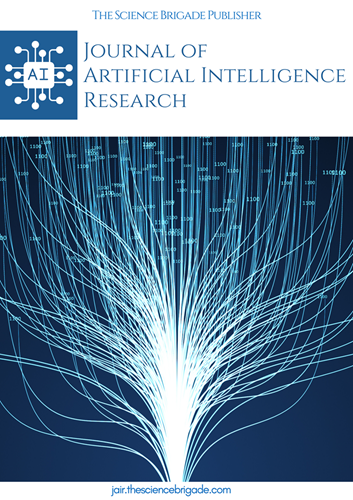Enhancing Disaster Response Systems: Predicting and Mitigating the Impact of Natural Disasters Using AI
Keywords:
AI, machine learning, data analyticsAbstract
Natural disasters, including hurricanes, wildfires, and earthquakes, cause catastrophic human and economic losses due to their unpredictable nature and the limitations of traditional response mechanisms. This study explores the application of artificial intelligence (AI) in enhancing disaster response systems by leveraging machine learning, data analytics, and real-time environmental monitoring. The proposed AI-driven framework integrates historical disaster data, meteorological trends, and sensor networks to predict disaster occurrences and optimize resource allocation for emergency management. Machine learning models, particularly deep learning architectures, enable precise forecasting of disaster patterns, thereby reducing response times and improving preparedness. The framework’s implementation in disaster-prone regions demonstrates its effectiveness in mitigating casualties and economic losses. The study also highlights computational challenges, data integration complexities, and the need for robust AI governance in disaster scenarios. Future advancements in AI-driven disaster response will further refine predictive capabilities and enhance adaptive mitigation strategies.
References
T. Ruan, H. Wang, R. Stolkin, and M. Chiou, "A Taxonomy of Semantic Information in Robot-Assisted Disaster Response," arXiv preprint arXiv:2210.00125, Sep. 2022.
J. So, K. Hsieh, B. Arzani, S. Noghabi, S. Avestimehr, and R. Chandra, "FedSpace: An Efficient Federated Learning Framework at Satellites and Ground Stations," arXiv preprint arXiv:2202.01267, Feb. 2022.
Y. Wang, Z. Su, Q. Xu, R. Li, T. H. Luan, and P. Wang, "A Secure and Intelligent Data Sharing Scheme for UAV-Assisted Disaster Rescue," arXiv preprint arXiv:2211.12988, Nov. 2022.
S. Panda, A. Mukherjee, R. Halder, and S. Mondal, "Blockchain-Enabled Emergency Detection and Response in Mobile Healthcare System," in Proc. IEEE Int. Conf. Blockchain and Cryptocurrency (ICBC), May 2022.
L. Raftree, "The Trump Administration Wants USAID on the Blockchain," WIRED, Mar. 2025.
IEEE Blockchain Technical Community, "Standards,"
V. S. Chavan and S. S. Patil, "Artificial Intelligence for Natural Disaster Management," IEEE Potentials, vol. 41, no. 6, pp. 19–23, Nov.-Dec. 2022.
M. A. Rahman, M. M. Islam, and M. S. Islam, "Applications of Artificial Intelligence in Disaster Management," ACM Trans. Asian Low-Resour. Lang. Inf. Process., vol. 21, no. 2, pp. 1–20, Feb. 2022.
A. H. M. Rahman and A. S. M. Kayes, "Federated Transfer Learning for Disaster Classification in Social Computing," Heliyon, vol. 7, no. 9, e07921, Sep. 2021.
J. Zhang, Y. Chen, and L. Wang, "An IoE Blockchain-Based Network Knowledge Management Model for Disaster Management," J. Innov. Digit. Ecosyst., vol. 9, pp. 100063, Dec. 2023.
A. Sharma and R. Gupta, "A Framework for Blockchain in Anticipatory Action," Int. J. Disaster Risk Reduct., vol. 85, pp. 103450, Nov. 2023.
S. K. Singh and P. K. Gupta, "Multimodal Fusion for Disaster Event Classification on Social Media," in Proc. ACM Int. Conf. Multimodal Interaction (ICMI), Nov. 2022, pp. 435–444.
L. Y. Chen and M. S. Hossain, "Explainable Artificial Intelligence in Disaster Risk Management," Int. J. Disaster Risk Reduct., vol. 85, pp. 103450, Nov. 2023.
M. A. Rahman, M. M. Islam, and M. S. Islam, "Deep Artificial Intelligence Applications for Natural Disaster Management," Ecol. Inform., vol. 76, pp. 101891, Dec. 2023.
S. K. Singh and P. K. Gupta, "Blockchain-Envisioned UAV-Aided Disaster Relief Networks," arXiv preprint arXiv:2310.05180, Oct. 2023.
A. Sharma and R. Gupta, "Leveraging Disruptive Technologies for Faster and More Efficient Disaster Response," Sustainability, vol. 16, no. 23, pp. 10730, Nov. 2023.
M. A. Rahman and M. S. Islam, "Potential Use of Artificial Intelligence (AI) in Disaster Risk and Crisis Management," Environ. Health Insights, vol. 17, pp. 11786302231217808, Dec. 2023.
S. K. Singh and P. K. Gupta, "An Evaluation on The Applicability of Blockchain Technology in Disaster Management," Atlas J. Sci. Res., vol. 9, no. 36, pp. 594–603, Jan. 2023.
A. Sharma and R. Gupta, "The Impact of Federated Learning on Urban Computing," J. Inf. Syst. Appl., vol. 4, no. 2, pp. 1–15, Apr. 2023.
U.S. Environmental Protection Agency, "The Current State of Artificial Intelligence in Disaster Recovery," EPA/600/R-21/198, Nov. 2021.
Downloads
Published
How to Cite
Issue
Section
License

This work is licensed under a Creative Commons Attribution-NonCommercial-ShareAlike 4.0 International License.
License Terms
Ownership and Licensing:
Authors of this research paper submitted to the journal owned and operated by The Science Brigade Group retain the copyright of their work while granting the journal certain rights. Authors maintain ownership of the copyright and have granted the journal a right of first publication. Simultaneously, authors agreed to license their research papers under the Creative Commons Attribution-NonCommercial-ShareAlike 4.0 International (CC BY-NC-SA 4.0) License.
License Permissions:
Under the CC BY-NC-SA 4.0 License, others are permitted to share and adapt the work, as long as proper attribution is given to the authors and acknowledgement is made of the initial publication in the Journal. This license allows for the broad dissemination and utilization of research papers.
Additional Distribution Arrangements:
Authors are free to enter into separate contractual arrangements for the non-exclusive distribution of the journal's published version of the work. This may include posting the work to institutional repositories, publishing it in journals or books, or other forms of dissemination. In such cases, authors are requested to acknowledge the initial publication of the work in this Journal.
Online Posting:
Authors are encouraged to share their work online, including in institutional repositories, disciplinary repositories, or on their personal websites. This permission applies both prior to and during the submission process to the Journal. Online sharing enhances the visibility and accessibility of the research papers.
Responsibility and Liability:
Authors are responsible for ensuring that their research papers do not infringe upon the copyright, privacy, or other rights of any third party. The Science Brigade Publishers disclaim any liability or responsibility for any copyright infringement or violation of third-party rights in the research papers.




